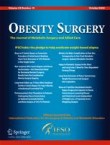
Abstract
Purpose
Weight regain after balloon retrieval is a concern with all intra-gastric balloons (IGBs). The aim of this study was to evaluate the efficacy of liraglutide, a glucagon-like peptide-1 (GLP-1) agonist, to prevent weight regain following IGB retrieval.
Materials and Methods
This was a case-matched study of patients undergoing Spatz3 adjustable IGB (Spatz FGIA, Inc. NY, USA) at three outpatient clinics in Brazil between November 2015 and January 2019. Seventy-seven patients that opted to take liraglutide following IGB retrieval (IGB-L) were matched 1:1 to 198 patients that declined the medication—IGB-Alone (IGB-A). Propensity score adjustment was performed at the time of balloon retrieval on factors known to influence the choice of liraglutide. Weight and percent body fat (%BF) was measured at baseline and 9 months after IGB retrieval. % BF is defined as the total mass of fat divided by total body mass, multiplied by 100. The primary outcome was weight regain, and the secondary outcome was change in %BF 9 months after IGB retrieval.
Results
Propensity score matching yielded 53 matched pairs. Weight regain to the starting point was not observed in either group. There was significantly less weight regain in IGB-L compared to IGB-A, − 1.15 ± 0.94 kg versus − 0.66 ± 0.99 kg (p = 0.010) 9 months after balloon retrieval. Additionally, %BF decline in IGB-L was superior to IGB-A − 10.83 ± 1.50 versus − 7.94 ± 2.02 (p < 0.01). There was no difference in weight regain or decline in %BF based on liraglutide dose.
Conclusion
Liraglutide has an additive benefit with respect to efficacy and a reduction in body fat when commenced after IGB retrieval. Future randomized control studies will be needed to determine the optimal dose and duration of liraglutide to achieve superior outcomes.
Δεν υπάρχουν σχόλια:
Δημοσίευση σχολίου